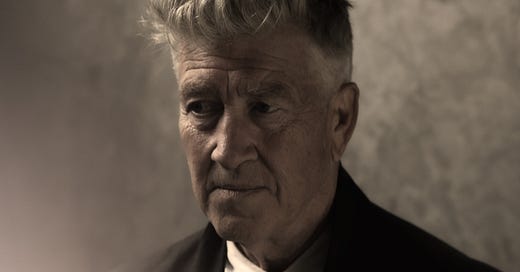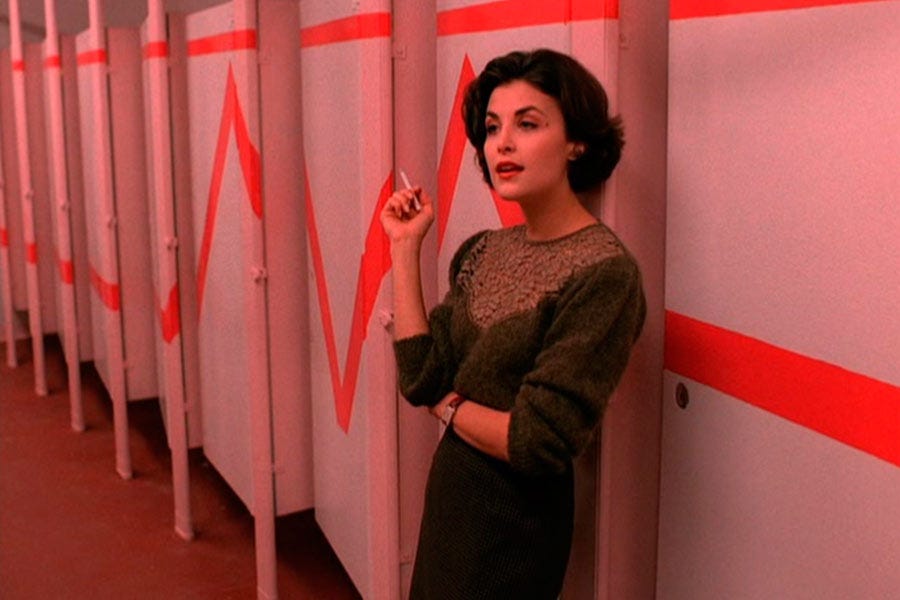David Lynch has been the beating heart soundtrack to so much of my life as a music-maker and creative. When the news of his death hit last night I couldn’t quite believe that he is no longer with us. I don’t have new words right now but back in 2014 I wrote this piece about what I felt the term “Lynchian” means.
Just leaving it here now…
The Music Of Twin Peaks Dissected: What Does ‘Lynchian’ Actually Mean?
“Lynchian” has become something of a code word for any band employing ethereal vocal treatments and textured foreboding synthesisers; a convenient shorthand you might say for the “weird and wonderful” that to my mind doesn’t really do justice to the full emotional punch of composer Angelo Badalamenti and David Lynch’s original 1990 Grammy-winning score for Twin Peaks.
Although he hasn’t directed a film proper (that Duran Duran live movie doesn’t count) since 2006’s Inland Empire, the signature sound from Lynch’s cult TV series has become a touchstone for a host of bands from Zola Jesus to Dirty Beaches. From Lana Del Rey’s grainy glamour, to Chromatics’ ice-cold ambience on the Drive OST, Lynch’s influence on today’s musical landscape seems, superficially speaking, omnipresent.
But for me, there’s much more to the sonic universe of David Lynch than that…
The essence of the Lynchian sound is a collision of several discrete elements that all combine together to create that uneasy mélange of luxuriant melodrama and impending horror. You can hear it in the velvet-draped tones of Lana Del Rey, the whammy-bar twang of Gemma Ray’s 50s styled guitars, the reverb-drenched vocals of Lynch darlings Au Revoir Simone, and the insistent minor key that’s upended by the hopeful turning chord in Perfume Genius’ work.
I think, however, it’s helpful to make a distinction between the musical aesthetics of Lynch and the complex meanings interwoven into his narratives – the latter much more intriguing to me as a musician who is also interested in exploring ideas about the performativity of identity and gender.
“Lynchian” isn’t really a sound per se, it’s a tone and texture. It’s the slow seep-through from the dream state that lingers in your memory, and rather than melody or structured songs it’s a mixture of mist and radio static. The Lynchian landscape is one of grey hues of blue and avocado greens that are slowly turning brown; the rotting carcass on the underside of the perfectly manicured suburban lawn; the Thing behind the back of Denny’s.
It’s amazing how those thin, barely-there sounds – that take a little of Brian Eno’s ambience and the slow-flowing waterfalls of Cocteau Twins – evoke so much. It’s this Lynchian influence that has found its way into my own music, particularly into the instrumental segues on my forthcoming album as The Anchoress, Confessions of a Romance Novelist, where I wanted to weave micro-narratives between the songs, delving into the ugly unconscious of the female narrator.
The roots of the distinctive female vocal sound so often associated with Lynch’s work are firmly rooted with American singer Julee Cruise. Cruise’s ‘Falling’, which was repurposed as an instrumental for the theme tune for Twin Peaks, reportedly took just 20 minutes to write. Badalamenti and Lynch had begun collaborating with Cruise on ‘Mysteries of Love’ (which appeared on the Blue Velvet OST) – Lynch had met Badalamenti when the composer was drafted in to help Isabella Rossellini with her vocal on the film’s title track. Lynch had originally wanted to use This Mortal Coil’s version of Tim Buckley’s ‘Song to the Siren’ but drafted in Cruise to sing ‘Mysteries of Love’ instead when the sync fee was considered too high by the studio bosses.
Although she eschews the pure, unornamented vocal style that Badalamenti loved so much about Cruise’s voice, Lynch’s love for the languidly luxuriant is ever-present in Lana Del Rey’s vocal stylings, as well as in the carefully crafted public personae that could have stepped out of any of Lynch’s films. Alongside Bat for Lashes ‘Laura’, and the noddingly titled ‘Who Killed Amanda Palmer’, it’s fair to say that Lizzy Grant is probably David Lynch’s most successful disciple. (Watch her cover ‘Blue Velvet’ below). For her, his influence is one of atmosphere as well as thematics:
More often than not, those who cite Lynch as an influence are merely reducing his textures and themes to a simple checklist (I realise the irony that I’m at risk of doing the same here..) And they’re not the only ones. From the outside, it seems like journalists looking for synonyms for “ethereal” often reach for “Lynchian”, especially when it’s a sound where undulating dark synths and ghostly synthetic strings sit in contrast to one another. This is perhaps why “Lynchian” as a term has been regurgitated until it’s lost much of its meaning, becoming little more than shorthand for a “cool” or “odd” aesthetic, losing all of the nuance and subtlety that’s at the very core of Lynch’s ever-complex webs of references and meta-narratives.
The real magic of the Lynchian sound(track) is the way in which these gentle, meditative, uneasy, dreamscapes give way to sensual nightclub jazz, psychedelic jitterbug, and 50s rock & roll guitars that slide you into another room/realm/dream. The “sound” of Lynch’s work may appear to be powerful because the sparse synths open up a contemplative and safe space for the imagination to inhabit, but his real genius is the use of music for transition. When Lynch needs to lighten the mood or give you that feeling of spiralling into a dream, it’s music that subtly does the heavy lifting.
Catherine Anne Davies makes music under the guise The Anchoress.






I too mourn the passing of David Lynch. The news media each day tells that another icon of the arts has left us, or a TV soap celebrity has succumbed to the pressures of fame. Mostly, for me at least, there's a brief moment of sadness for that loss and for the pain those close to that person must be feeling. Probably followed by "still, 96 years old, that's a pretty good run" or "only 42, wow, much too young", and then the next news item arrives. Occasionally though, it cuts a little deeper. David Lynch brought unique colours and tones to everything he created and there was a depth, indeed, so many layers to his works that it required that you to watch them multiple times and you'd still find more. And sometimes it was just more questions, not more answers. Nothing throwaway here, it was all crafted with that distinctive “Lynchian” hand. So yes, for me too, his passing cuts a little deeper.
Gorgeous writing